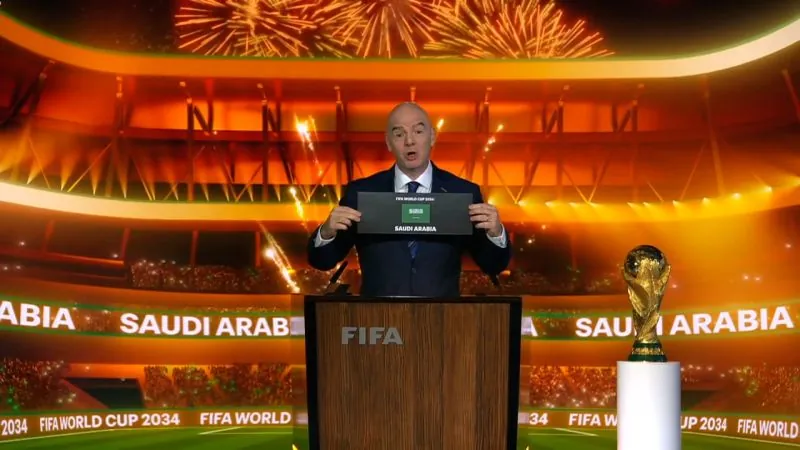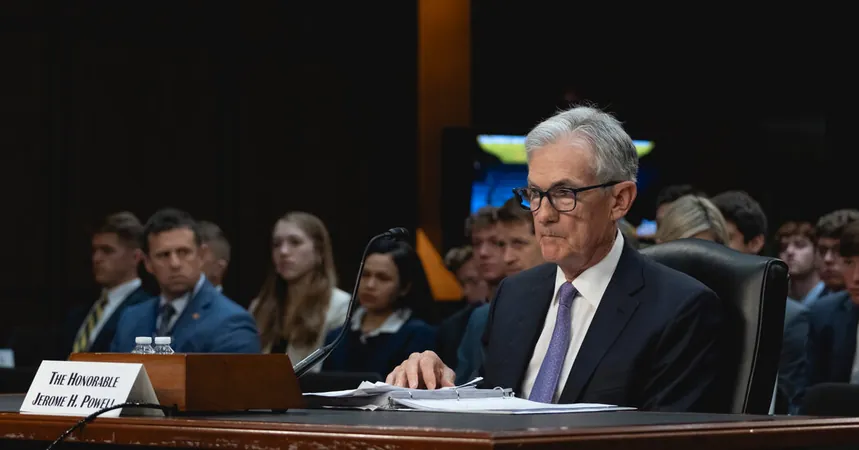
Saudi Arabia Selected to Host the 2034 World Cup amid Dire Human Rights Concerns
2024-12-11
Author: Yan
Saudi Arabia Selected to Host the 2034 World Cup amid Dire Human Rights Concerns
In a momentous announcement, FIFA has declared Saudi Arabia as the host of the 2034 World Cup, adding to the controversy surrounding the prestigious tournament. This decision follows the decision to award Spain, Portugal, and Morocco the hosting rights for the 2030 World Cup, which makes the news of Saudi Arabia's selection even more striking given the country's ongoing human rights issues.
Human rights advocates are raising significant alarms regarding the implications of hosting such a globally esteemed event in a nation often criticized for its oppressive policies. Michael Page, deputy director for the Middle East and North Africa at Human Rights Watch (HRW), cautioned that the decision could lead to an "unimaginable human cost," particularly with regard to the treatment of migrant workers.
The bidding process for the 2034 tournament has generated intense scrutiny, with critics highlighting systemic abuses of migrant workers, restricted freedom of speech, and the marginalization of minority groups within the Kingdom.
Saudi Arabia's Ambitious Investment in Sports
Saudi Arabia's pursuit of hosting the World Cup is part of a larger strategy to reshape its global image through sports investment. Crown Prince Mohammed bin Salman (MBS) has initiated this strategy under the framework of Vision 2030, aiming to diversify the economy and enhance the country’s international profile. The kingdom has invested heavily in various sports, striking deals and partnerships that boast significant visibility and prestige.
Notably, Saudi Arabia recently acquired the English Premier League club Newcastle United and has lured many football stars to its domestic league, signaling its burgeoning interest in soccer—a sport that captivates millions worldwide. The partnership between MBS and FIFA President Gianni Infantino symbolizes a strong bond that further reinforces Saudi Arabia's ambitions on the global sports stage.
To prepare for the World Cup, the Kingdom has laid out extensive plans for infrastructure development, including the construction or renovation of 11 stadiums and the creation of 185,000 hotel rooms. However, according to HRW and other watchdog groups, these ambitious projects will likely exploit migrant laborers who already work under dire conditions.
Human Rights Violations Under Scrutiny
HRW's report titled “Die First, and I’ll Pay You Later” highlights the structural violence faced by migrant laborers within Saudi Arabia, often tied down by the exploitative Kafala sponsorship system. Allegations include non-payment of wages, unsafe working conditions, and other forms of abuse, raising concerns that the tournament will inadvertently perpetuate these injustices.
Months before the World Cup announcement, women's rights activist Lina al-Hathloul pointed out that while some reforms have been discussed, the on-ground realities remain grim. She emphasized that the current regime lacks fundamental checks and balances, effectively operating as a police state under MBS, where dissent—even in the form of social media posts—can lead to severe punishment.
Reports of rising executions and the suppression of advocates for civil liberties further paint a concerning picture of the country's human rights landscape. With a documented increase in executions—in 2023 reaching a historical high of 300—al-Hathloul's narrative underscores the violent reality that many face in Saudi Arabia.
FIFA’s Responsibility and Ethical Considerations
FIFA, which reviewed Saudi Arabia’s bid alongside a law firm’s assessment, labeled the human rights risks as "medium." Critics argue that relying on assessments that do not engage independent observers renders their conclusions ineffective. Human rights organizations have urged FIFA to halt the decision-making process until demonstrable changes addressing the plight of migrant workers, gender equality, and freedom of expression are established.
As the world anticipates the 2034 World Cup, questions loom regarding how FIFA will navigate the complex interplay between sport and human rights. Previous tournaments in Russia and Qatar serve as precedents, reminding us that the shadow of sportswashing could darken this celebratory event.
Activists are calling for renewed public scrutiny of FIFA's decisions, warning that turning a blind eye could further entrench human rights abuses in the Kingdom. There remains hope that, with sufficient pressure and accountability, the decade leading up to the World Cup could serve as an opportunity to push for meaningful change.
Lina al-Hathloul remarked, "We have 10 years now, we have 10 years to encourage people to speak, to challenge and to push for positive change.” Her sentiment reinforces the belief that the World Cup can only be a beacon for progress if stakeholders commit to addressing the stark realities of human rights in Saudi Arabia.
With a decade until the world descends on Saudi Arabia, the conversations around human rights, governance, and ethical obligations in hosting global events will remain a focal point of international discourse. As the clock ticks down, all eyes will be on how nations and organizations respond to the challenges at hand.



 Brasil (PT)
Brasil (PT)
 Canada (EN)
Canada (EN)
 Chile (ES)
Chile (ES)
 España (ES)
España (ES)
 France (FR)
France (FR)
 Hong Kong (EN)
Hong Kong (EN)
 Italia (IT)
Italia (IT)
 日本 (JA)
日本 (JA)
 Magyarország (HU)
Magyarország (HU)
 Norge (NO)
Norge (NO)
 Polska (PL)
Polska (PL)
 Schweiz (DE)
Schweiz (DE)
 Singapore (EN)
Singapore (EN)
 Sverige (SV)
Sverige (SV)
 Suomi (FI)
Suomi (FI)
 Türkiye (TR)
Türkiye (TR)